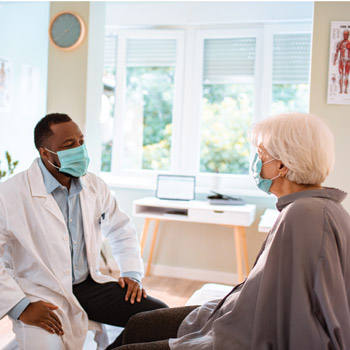Providing preventive care in a pandemic
This issue also covers medication for opioid use disorders, physicians as caregivers, and home blood pressure monitoring.
When COVID-19 hit the United States this spring, in-person doctors' visits for anything but related concerns seemed nearly unthinkable. Data so far show that visits for preventive care, including many types of screening, did plummet from January through April. But although some visits can be put on hold temporarily, others can't, and shouldn't. Our story looks at the ways in which preventive care is making a comeback, how internists can continue to encourage patients to once again present for necessary appointments, and how restrictions implemented by the pandemic may lead to permanent changes in primary care. (In other COVID-19 news, read coverage of a recent forum from ACP and Annals of Internal Medicine on the progress toward a vaccine.)
Another area where changes may be needed, experts say, is in attitudes toward treating opioid misuse. A recent study published in Annals of Internal Medicine found that many primary care physicians don't believe medication for opioid use disorder is effective and, what's more, don't want to prescribe it. Our second cover story looks at what might be needed to overcome these beliefs, including increased efforts at education and decreased regulation around use of buprenorphine in primary care.
Physicians whose family members become ill often take on the role of caregiver or are asked to weigh in on treatments or provide other advice. This dynamic may loom even larger during the COVID-19 pandemic, when uncertainty is common and trusted medical knowledge is vital. Our story offers practical advice on what physicians should expect of their loved ones' care teams, and of themselves, in these scenarios. And when patients and their caregivers need access to specific medical records, a patient portal could help if privacy concerns are considered.
In conference coverage, a cardiologist who spoke at Hypertension 2020 in September outlines why home blood pressure monitoring can be an important tool, including in low-income and minority populations. And a sleep medicine expert who spoke at SLEEP 2020 in August discusses telemedicine and online delivery methods for cognitive behavioral therapy for insomnia.
In other sleep news, the clocks "fell back" recently, and a researcher who found an association between both the start and end of daylight saving time and patient safety-related errors. That errors increase when we gain an hour of sleep as well as when we lose one adds to the growing body of evidence that daylight saving time's time may be up.
2020 comes to a close leaving much to reflect on, as ACP's President details in her column. It's our great privilege to be covering internal medicine for ACP members during these tumultuous times. We look forward to brighter days ahead in 2021. Please get in touch with us any time at immatters@acponline.org.
Sincerely,
Jennifer Kearney-Strouse
Executive Editor




